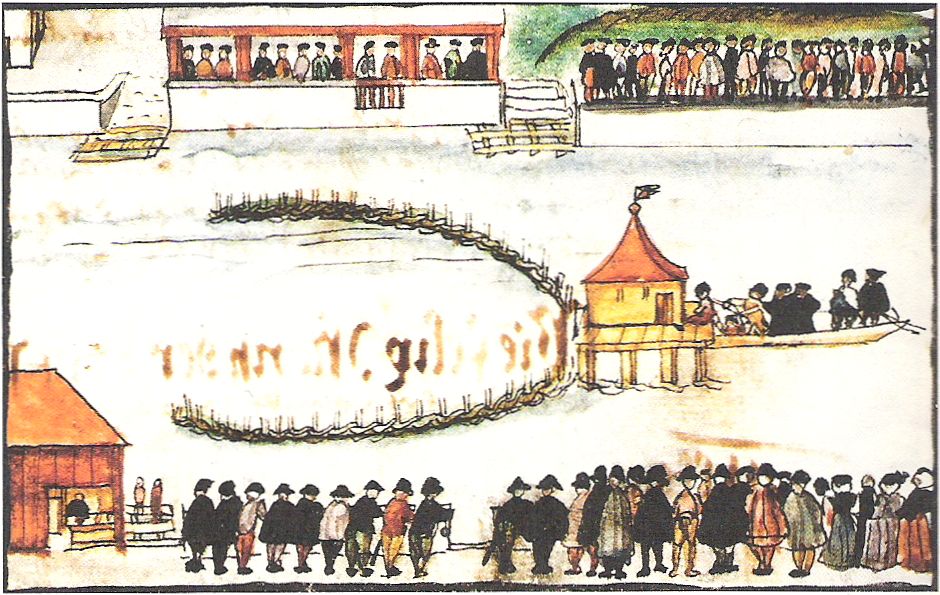![]() On this date, January 10, back in 49 B.C., Julius Caesar crossed the Rubicon, cast the die, and waded into an unending series of metaphors as well as a civil war that he won unless you count the bit where he was assassinated.
On this date, January 10, back in 49 B.C., Julius Caesar crossed the Rubicon, cast the die, and waded into an unending series of metaphors as well as a civil war that he won unless you count the bit where he was assassinated.
Especially in an era where cultural literacy is being lost, if not actively buried, it’s important to remember what crossing the Rubicon meant technically. The Rubicon is a shallow river in northeastern Italy, the crossing of which is not necessarily memorable as a rule. But (assuming the name has not wandered in the last 2000 years, which is a matter of some dispute) crossing it was a very big deal back in Caesar’s day because it was the frontier between the conquered Roman province of Cisalpine Gaul, and Italy proper. And while appointed governor held military authority ("imperium") in the provinces, only elected magistrates could do so within Italy itself given its proximity to Rome on which, just possibly, a man with soldiers under his command might suddenly march to seize power or some such.
For instance Julius Caesar. Caesar led his 13th legion ("Gemina") into Italy for the specific purpose of seizing power. And when he did so, he uttered the once-famous phrase "alea iacta est" ("the die is cast") meaning he had gambled everything and it was now too late to turn back because for an appointed governor to bring soldiers into Italy was open revolt and a capital offence.
Generally speaking if we use the metaphor today with any concept of its meaning, we refer simply to a decisively bold act. But there is a bit more to it, and it is less unequivocally praiseworthy. The reason crossing into Italy, over the Rubicon or any other otherwise insignificant marker, was a capital offence was that it was an attack on established authority and moreover in Caesar’s day, as Rome was still a Republic albeit very rickety by that point, an attack on civilian rule by those meant to be defending it instead.
The crucial political problem, then, now and always, has been to create a government able to protect liberty without being able to threaten it. It is by no means a simple problem or it would have been solved more often including in Rome. But Caesar’s contribution was to shove it aside in favour of the question of which strongman should rule, whose answer is far simpler but far less satisfactory.
The main difficulty through history is that most governments have been too weak to sustain themselves against invasion or upheaval even when plenty strong enough to oppress their citizens in the average course of events. You could not solve the former problem by further strengthening it without making the latter even worse. And you could not solve the latter without making the former worse.
The Romans did better than a lot of people, sustaining a Republic for nearly five hundred years. It had its flaws, both in its internal law and in its tendency to expand without regard for the niceties of law or justice, although it was on the whole a great deal better than its rivals in foreign as in domestic policy. But it caromed between anarchy and tyranny until the latter finally prevailed decisively, alternating the two problems rather than finding a solution that transcended them.
Not until medieval parliaments, backed by an alert and armed citizenry, did a more stable and attractive solution emerge, one we still enjoy today although its foundations are showing worrisome cracks and signs of crumbling. And so when we recall that in crossing the Rubicon Caesar cast the die once and for all, we should recall not merely his admirable boldness and directness but also his understandable but regrettable determination to bury popular government which, after the conspirators buried him, did succeed in the persons of Augustus, Tiberius and on down through the imperial centuries.
Like a few other great conquerors, such as Alexander and Napoleon, Julius Caesar has always seemed to me to combine military genius and political adroitness with a curious vagueness about what it was all for. And while it takes nerve to cross the Rubicon and courage is in principle a virtue, it was not in Caesar’s case directed to a praiseworthy end.


